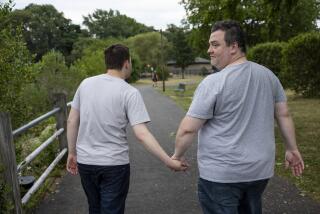O.C. Autism Center Opens; Focus Is Early Treatment, Research
Benjamin Dynes is a spirited 4-year-old with intense brown eyes and a predilection for stuffed animals.
But he didn’t start speaking until he was 3, said his mother, Brigitt Minieri, and ceiling fans and airplane noises often stopped him cold.
Then, last year, Minieri and her husband, Joseph Dynes, both 39, received a diagnosis: autism.
“I was devastated,” said the Irvine woman. “When he was 2, the doctor was telling us that because we had a Spanish-speaking baby-sitter, Benjamin might be confused.”
Such tales are too common, said Dr. Pauline A. Filipek, director of an autism center in Orange that opened Wednesday.
The signs of autism, especially in mild forms, are often dismissed by pediatricians and other doctors as normal developmental delays, said Filipek, an associate professor of pediatrics and neurology at UC Irvine Medical School.
Yet early detection is crucial, Filipek and other experts say, because prompt intervention greatly improves the chances that autistic children will develop social and communication skills into adulthood. The brain is more malleable at a young age and better suited to treatment.
The new center, called For OC Kids and developed by the UC Irvine Medical Center’s Department of Pediatrics, is the first of its kind in Orange County. It will focus on early diagnosis, treatment and research of the perplexing mental disorder, which experts estimate affects as many as one in 250 children worldwide.
The number of autism cases has soared worldwide during the last two decades, although experts cannot say how much of it is the result of better diagnosis rather than an actual increase.
Autism is a neurological disorder characterized by poor communication skills, often causing children to become isolated from the world around them.
Nearly 15,000 children with autism are enrolled in programs provided by the California Department of Developmental Services, about three times the number a decade ago.
In the Los Angeles Unified School District, the number of students eligible for special education services because of autism has grown more than fourfold, from 623 a decade ago to 2,797.
In Orange County, special education students in kindergarten through 12th grade diagnosed with autism jumped from 105 in 1992 to more than 1,000 last year.
Last year, Filipek and a panel of experts created guidelines for doctors and parents to recognize possible signs of autism in children as young as 2.
According to the standards, children should babble or gesture by 12 months and be able to speak single words by 16 months and two-word phrases by 24 months.
Hearing and developmental testing are suggested for a child who misses those milestones. If the results continue to suggest autism, a neurological evaluation is recommended.
Filipek said most doctors tend to reassure parents whose children are slow to develop skills, saying that they will grow out of it or, in the case of boys, that they usually start speaking later than girls.
The new center, funded by a $1.8-million grant from the tobacco tax approved by voters in 1998, will also create questionnaires for local doctors to improve awareness about autism.
The center offers language and physical therapy designed to help autistic children develop social skills so they can function relatively independently in the world.
More to Read
Sign up for Essential California
The most important California stories and recommendations in your inbox every morning.
You may occasionally receive promotional content from the Los Angeles Times.










